Impact of Sociological Principles on Health and Social Care: A Report
VerifiedAdded on 2020/01/21
|11
|3559
|119
Report
AI Summary
This report provides a comprehensive analysis of sociological principles within the context of health and social care. It begins by examining political, social, and economic constructs used to categorize society and assesses current trends in societal change and their impact on health services. The report explores the influence of cultural values and beliefs on healthcare practices and evaluates the implications of societal changes on the sector. Task 2 delves into Talcott Parsons' "Sick Role" theory from a functionalist perspective, comparing it with symbolic interactionism. It explains the concept of social construct and applies it to the sick role, evaluating the strengths and weaknesses of Parsons' ideas. The report concludes with a reflective account and references, offering a detailed understanding of the interplay between sociological principles and health and social care practices.
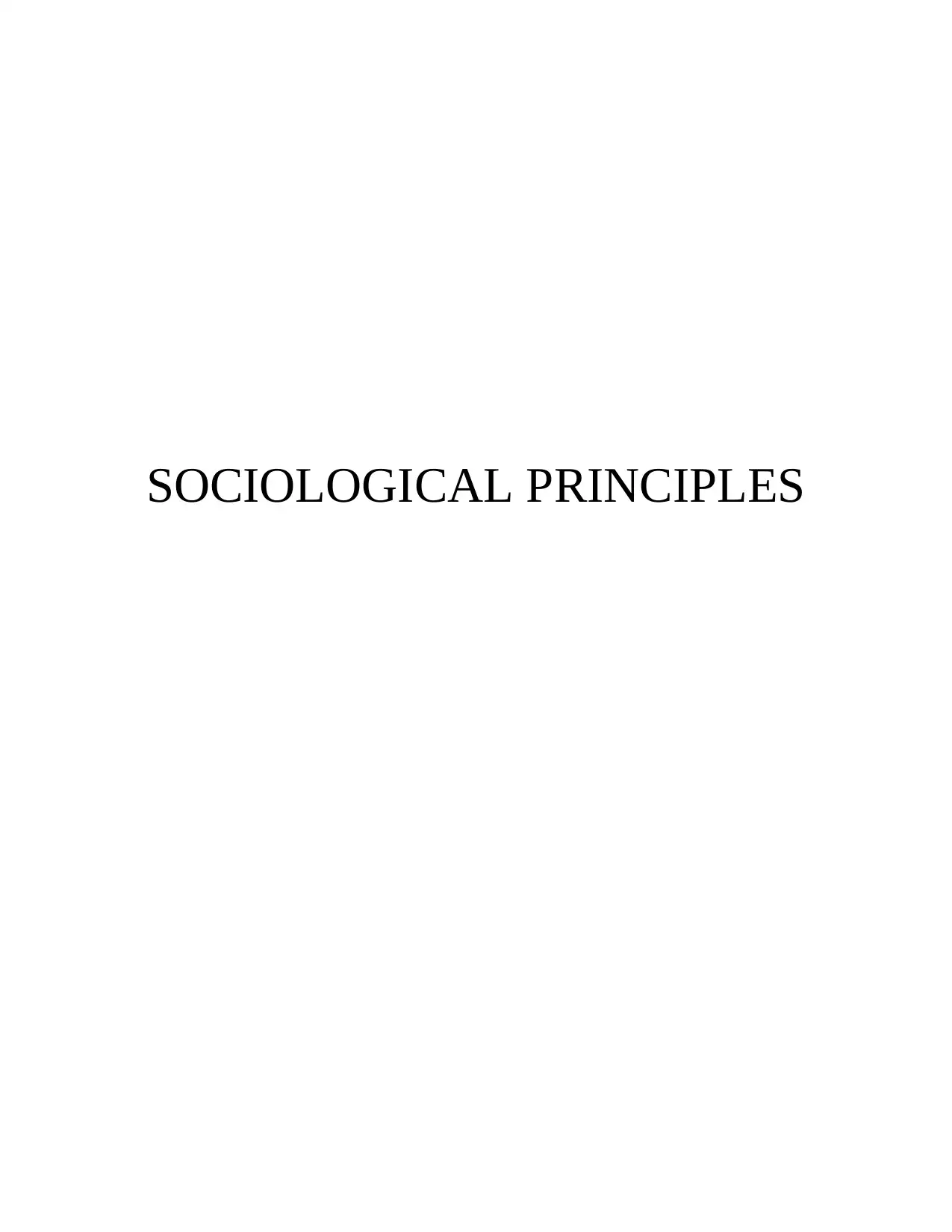
SOCIOLOGICAL PRINCIPLES
Paraphrase This Document
Need a fresh take? Get an instant paraphrase of this document with our AI Paraphraser
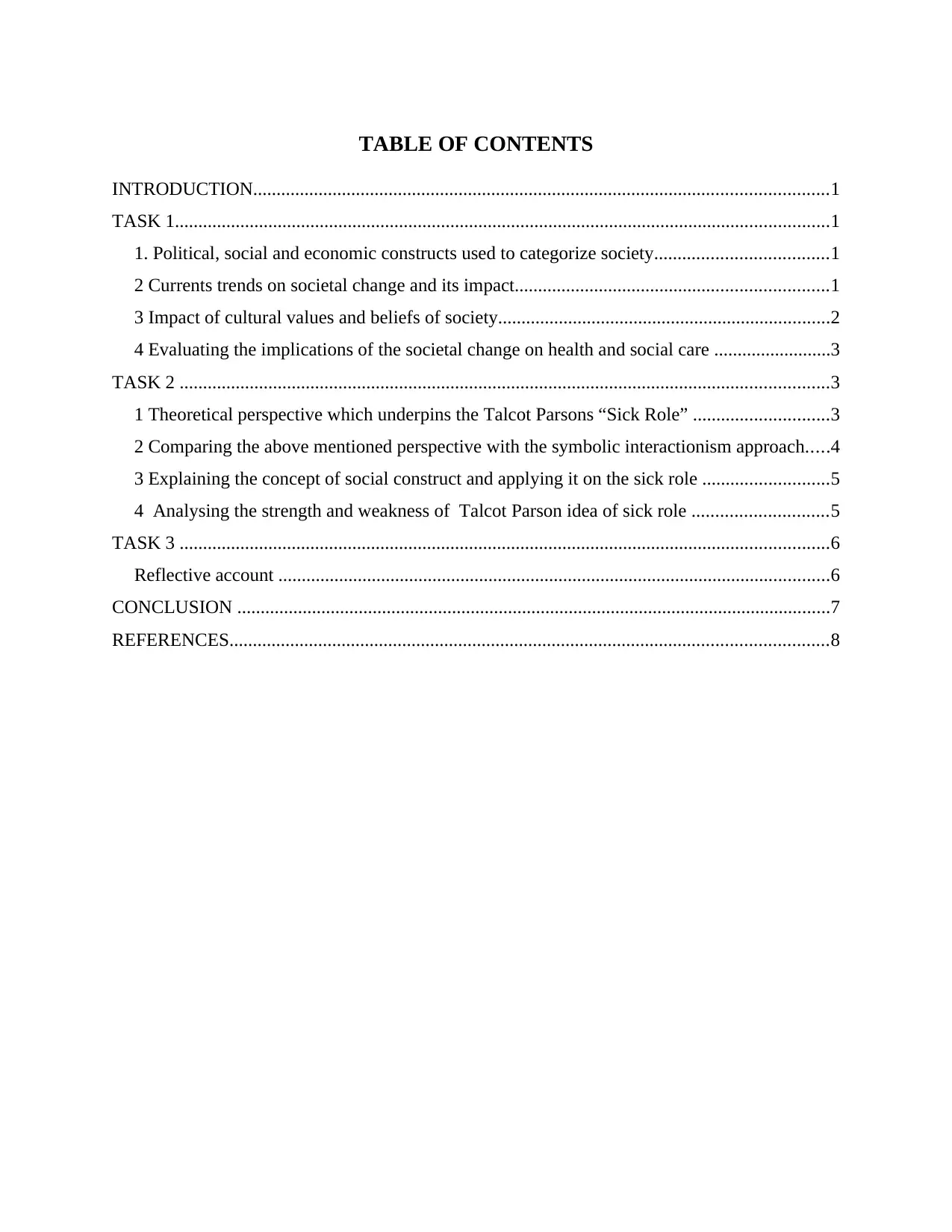
TABLE OF CONTENTS
INTRODUCTION...........................................................................................................................1
TASK 1............................................................................................................................................1
1. Political, social and economic constructs used to categorize society.....................................1
2 Currents trends on societal change and its impact...................................................................1
3 Impact of cultural values and beliefs of society.......................................................................2
4 Evaluating the implications of the societal change on health and social care .........................3
TASK 2 ...........................................................................................................................................3
1 Theoretical perspective which underpins the Talcot Parsons “Sick Role” .............................3
2 Comparing the above mentioned perspective with the symbolic interactionism approach.....4
3 Explaining the concept of social construct and applying it on the sick role ...........................5
4 Analysing the strength and weakness of Talcot Parson idea of sick role .............................5
TASK 3 ...........................................................................................................................................6
Reflective account ......................................................................................................................6
CONCLUSION ...............................................................................................................................7
REFERENCES................................................................................................................................8
INTRODUCTION...........................................................................................................................1
TASK 1............................................................................................................................................1
1. Political, social and economic constructs used to categorize society.....................................1
2 Currents trends on societal change and its impact...................................................................1
3 Impact of cultural values and beliefs of society.......................................................................2
4 Evaluating the implications of the societal change on health and social care .........................3
TASK 2 ...........................................................................................................................................3
1 Theoretical perspective which underpins the Talcot Parsons “Sick Role” .............................3
2 Comparing the above mentioned perspective with the symbolic interactionism approach.....4
3 Explaining the concept of social construct and applying it on the sick role ...........................5
4 Analysing the strength and weakness of Talcot Parson idea of sick role .............................5
TASK 3 ...........................................................................................................................................6
Reflective account ......................................................................................................................6
CONCLUSION ...............................................................................................................................7
REFERENCES................................................................................................................................8
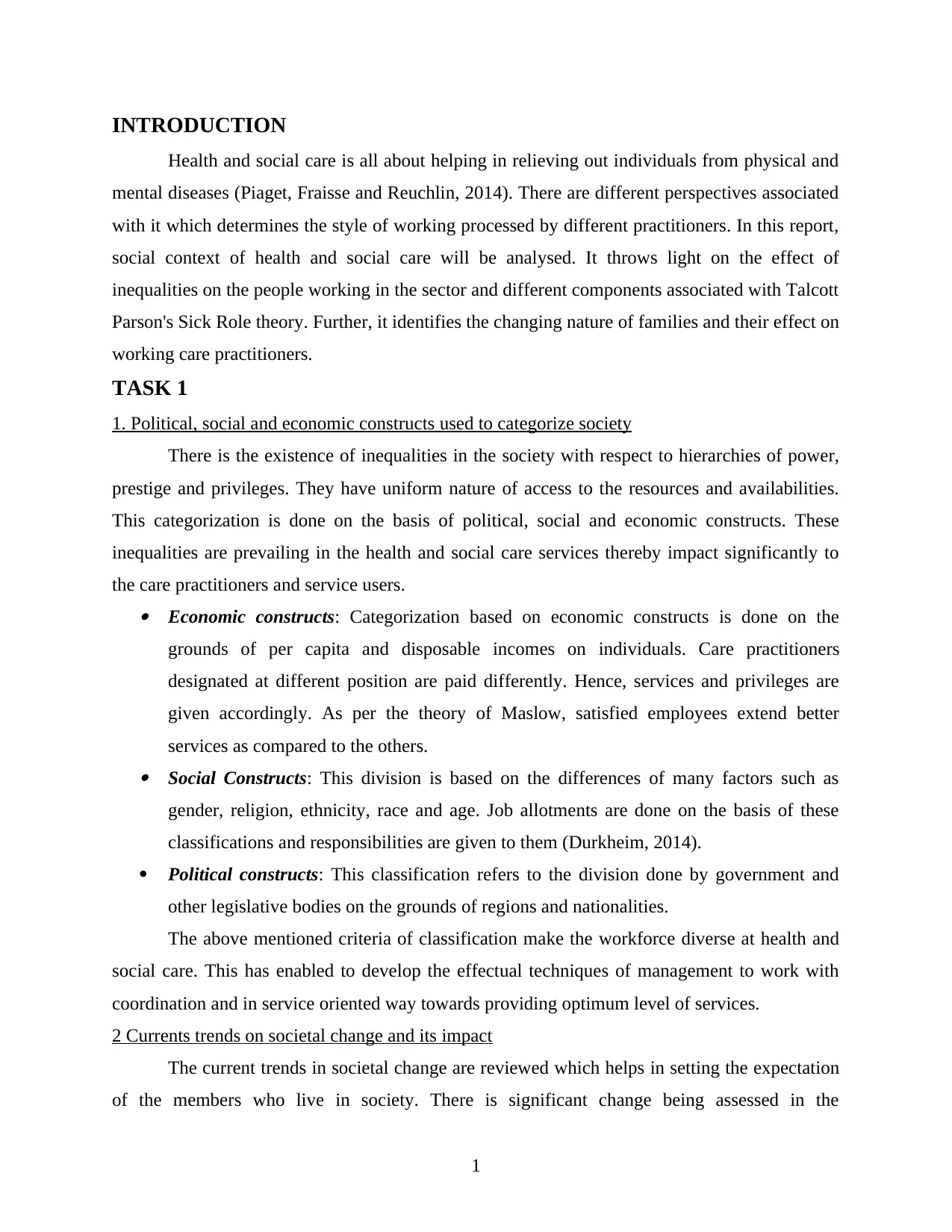
INTRODUCTION
Health and social care is all about helping in relieving out individuals from physical and
mental diseases (Piaget, Fraisse and Reuchlin, 2014). There are different perspectives associated
with it which determines the style of working processed by different practitioners. In this report,
social context of health and social care will be analysed. It throws light on the effect of
inequalities on the people working in the sector and different components associated with Talcott
Parson's Sick Role theory. Further, it identifies the changing nature of families and their effect on
working care practitioners.
TASK 1
1. Political, social and economic constructs used to categorize society
There is the existence of inequalities in the society with respect to hierarchies of power,
prestige and privileges. They have uniform nature of access to the resources and availabilities.
This categorization is done on the basis of political, social and economic constructs. These
inequalities are prevailing in the health and social care services thereby impact significantly to
the care practitioners and service users. Economic constructs: Categorization based on economic constructs is done on the
grounds of per capita and disposable incomes on individuals. Care practitioners
designated at different position are paid differently. Hence, services and privileges are
given accordingly. As per the theory of Maslow, satisfied employees extend better
services as compared to the others. Social Constructs: This division is based on the differences of many factors such as
gender, religion, ethnicity, race and age. Job allotments are done on the basis of these
classifications and responsibilities are given to them (Durkheim, 2014).
Political constructs: This classification refers to the division done by government and
other legislative bodies on the grounds of regions and nationalities.
The above mentioned criteria of classification make the workforce diverse at health and
social care. This has enabled to develop the effectual techniques of management to work with
coordination and in service oriented way towards providing optimum level of services.
2 Currents trends on societal change and its impact
The current trends in societal change are reviewed which helps in setting the expectation
of the members who live in society. There is significant change being assessed in the
1
Health and social care is all about helping in relieving out individuals from physical and
mental diseases (Piaget, Fraisse and Reuchlin, 2014). There are different perspectives associated
with it which determines the style of working processed by different practitioners. In this report,
social context of health and social care will be analysed. It throws light on the effect of
inequalities on the people working in the sector and different components associated with Talcott
Parson's Sick Role theory. Further, it identifies the changing nature of families and their effect on
working care practitioners.
TASK 1
1. Political, social and economic constructs used to categorize society
There is the existence of inequalities in the society with respect to hierarchies of power,
prestige and privileges. They have uniform nature of access to the resources and availabilities.
This categorization is done on the basis of political, social and economic constructs. These
inequalities are prevailing in the health and social care services thereby impact significantly to
the care practitioners and service users. Economic constructs: Categorization based on economic constructs is done on the
grounds of per capita and disposable incomes on individuals. Care practitioners
designated at different position are paid differently. Hence, services and privileges are
given accordingly. As per the theory of Maslow, satisfied employees extend better
services as compared to the others. Social Constructs: This division is based on the differences of many factors such as
gender, religion, ethnicity, race and age. Job allotments are done on the basis of these
classifications and responsibilities are given to them (Durkheim, 2014).
Political constructs: This classification refers to the division done by government and
other legislative bodies on the grounds of regions and nationalities.
The above mentioned criteria of classification make the workforce diverse at health and
social care. This has enabled to develop the effectual techniques of management to work with
coordination and in service oriented way towards providing optimum level of services.
2 Currents trends on societal change and its impact
The current trends in societal change are reviewed which helps in setting the expectation
of the members who live in society. There is significant change being assessed in the
1
⊘ This is a preview!⊘
Do you want full access?
Subscribe today to unlock all pages.

Trusted by 1+ million students worldwide
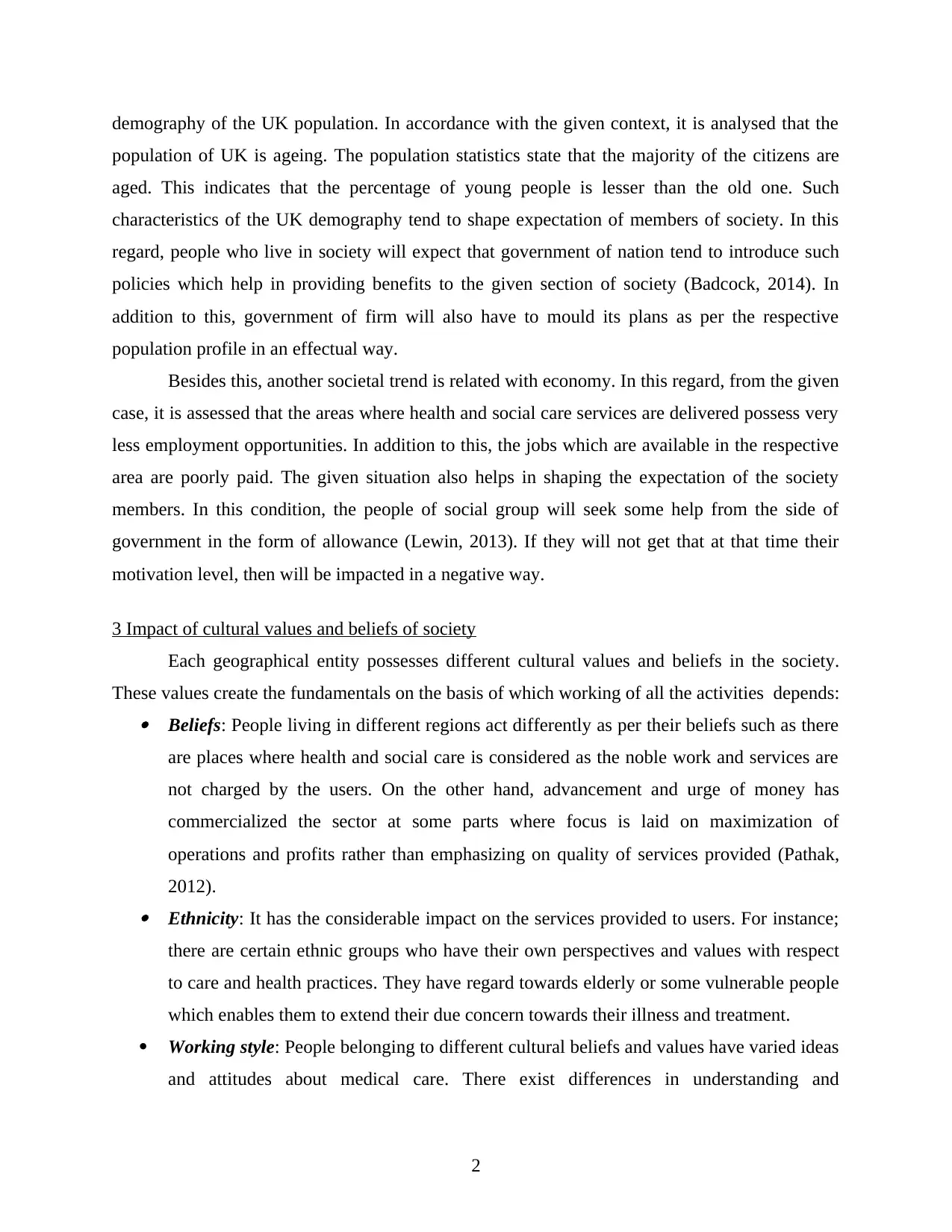
demography of the UK population. In accordance with the given context, it is analysed that the
population of UK is ageing. The population statistics state that the majority of the citizens are
aged. This indicates that the percentage of young people is lesser than the old one. Such
characteristics of the UK demography tend to shape expectation of members of society. In this
regard, people who live in society will expect that government of nation tend to introduce such
policies which help in providing benefits to the given section of society (Badcock, 2014). In
addition to this, government of firm will also have to mould its plans as per the respective
population profile in an effectual way.
Besides this, another societal trend is related with economy. In this regard, from the given
case, it is assessed that the areas where health and social care services are delivered possess very
less employment opportunities. In addition to this, the jobs which are available in the respective
area are poorly paid. The given situation also helps in shaping the expectation of the society
members. In this condition, the people of social group will seek some help from the side of
government in the form of allowance (Lewin, 2013). If they will not get that at that time their
motivation level, then will be impacted in a negative way.
3 Impact of cultural values and beliefs of society
Each geographical entity possesses different cultural values and beliefs in the society.
These values create the fundamentals on the basis of which working of all the activities depends: Beliefs: People living in different regions act differently as per their beliefs such as there
are places where health and social care is considered as the noble work and services are
not charged by the users. On the other hand, advancement and urge of money has
commercialized the sector at some parts where focus is laid on maximization of
operations and profits rather than emphasizing on quality of services provided (Pathak,
2012). Ethnicity: It has the considerable impact on the services provided to users. For instance;
there are certain ethnic groups who have their own perspectives and values with respect
to care and health practices. They have regard towards elderly or some vulnerable people
which enables them to extend their due concern towards their illness and treatment.
Working style: People belonging to different cultural beliefs and values have varied ideas
and attitudes about medical care. There exist differences in understanding and
2
population of UK is ageing. The population statistics state that the majority of the citizens are
aged. This indicates that the percentage of young people is lesser than the old one. Such
characteristics of the UK demography tend to shape expectation of members of society. In this
regard, people who live in society will expect that government of nation tend to introduce such
policies which help in providing benefits to the given section of society (Badcock, 2014). In
addition to this, government of firm will also have to mould its plans as per the respective
population profile in an effectual way.
Besides this, another societal trend is related with economy. In this regard, from the given
case, it is assessed that the areas where health and social care services are delivered possess very
less employment opportunities. In addition to this, the jobs which are available in the respective
area are poorly paid. The given situation also helps in shaping the expectation of the society
members. In this condition, the people of social group will seek some help from the side of
government in the form of allowance (Lewin, 2013). If they will not get that at that time their
motivation level, then will be impacted in a negative way.
3 Impact of cultural values and beliefs of society
Each geographical entity possesses different cultural values and beliefs in the society.
These values create the fundamentals on the basis of which working of all the activities depends: Beliefs: People living in different regions act differently as per their beliefs such as there
are places where health and social care is considered as the noble work and services are
not charged by the users. On the other hand, advancement and urge of money has
commercialized the sector at some parts where focus is laid on maximization of
operations and profits rather than emphasizing on quality of services provided (Pathak,
2012). Ethnicity: It has the considerable impact on the services provided to users. For instance;
there are certain ethnic groups who have their own perspectives and values with respect
to care and health practices. They have regard towards elderly or some vulnerable people
which enables them to extend their due concern towards their illness and treatment.
Working style: People belonging to different cultural beliefs and values have varied ideas
and attitudes about medical care. There exist differences in understanding and
2
Paraphrase This Document
Need a fresh take? Get an instant paraphrase of this document with our AI Paraphraser
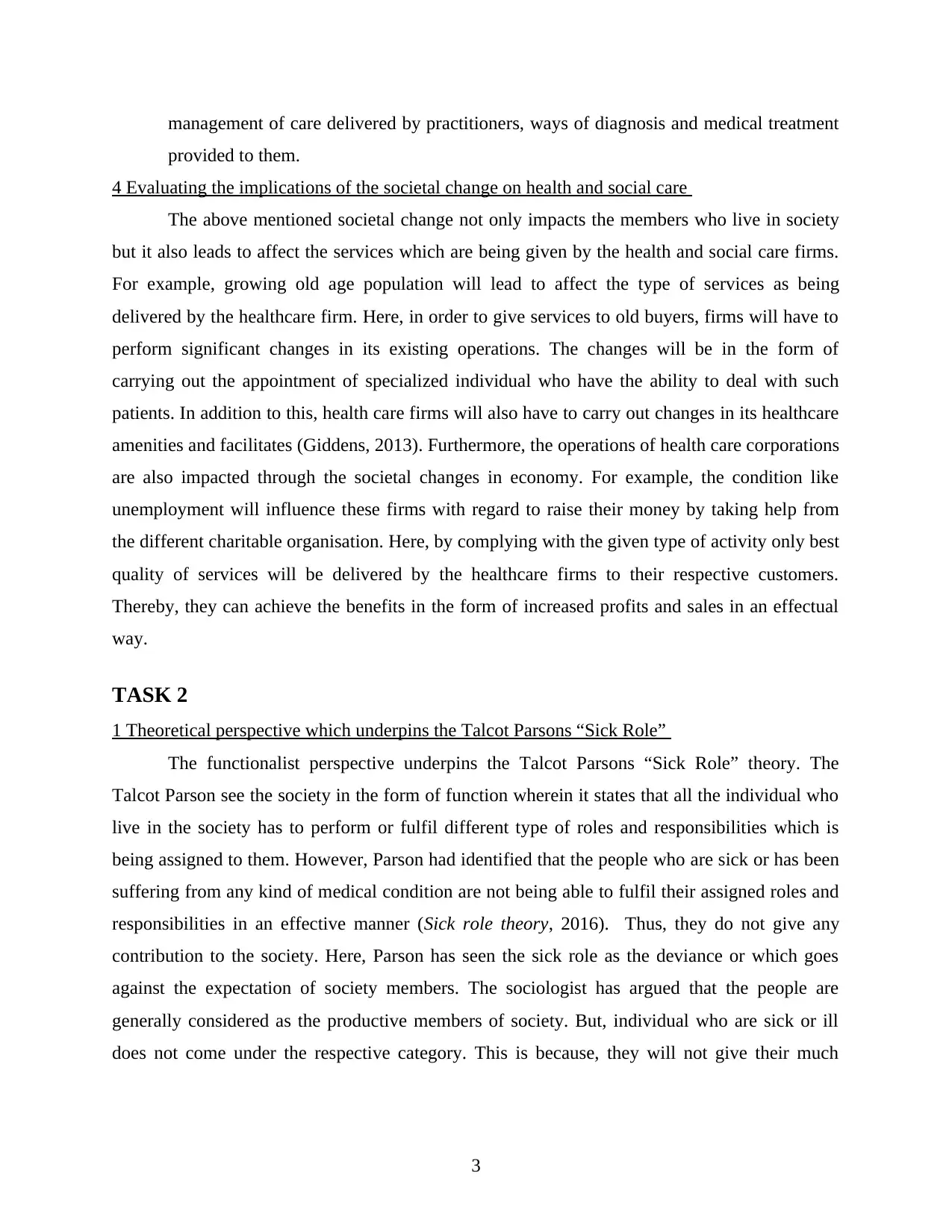
management of care delivered by practitioners, ways of diagnosis and medical treatment
provided to them.
4 Evaluating the implications of the societal change on health and social care
The above mentioned societal change not only impacts the members who live in society
but it also leads to affect the services which are being given by the health and social care firms.
For example, growing old age population will lead to affect the type of services as being
delivered by the healthcare firm. Here, in order to give services to old buyers, firms will have to
perform significant changes in its existing operations. The changes will be in the form of
carrying out the appointment of specialized individual who have the ability to deal with such
patients. In addition to this, health care firms will also have to carry out changes in its healthcare
amenities and facilitates (Giddens, 2013). Furthermore, the operations of health care corporations
are also impacted through the societal changes in economy. For example, the condition like
unemployment will influence these firms with regard to raise their money by taking help from
the different charitable organisation. Here, by complying with the given type of activity only best
quality of services will be delivered by the healthcare firms to their respective customers.
Thereby, they can achieve the benefits in the form of increased profits and sales in an effectual
way.
TASK 2
1 Theoretical perspective which underpins the Talcot Parsons “Sick Role”
The functionalist perspective underpins the Talcot Parsons “Sick Role” theory. The
Talcot Parson see the society in the form of function wherein it states that all the individual who
live in the society has to perform or fulfil different type of roles and responsibilities which is
being assigned to them. However, Parson had identified that the people who are sick or has been
suffering from any kind of medical condition are not being able to fulfil their assigned roles and
responsibilities in an effective manner (Sick role theory, 2016). Thus, they do not give any
contribution to the society. Here, Parson has seen the sick role as the deviance or which goes
against the expectation of society members. The sociologist has argued that the people are
generally considered as the productive members of society. But, individual who are sick or ill
does not come under the respective category. This is because, they will not give their much
3
provided to them.
4 Evaluating the implications of the societal change on health and social care
The above mentioned societal change not only impacts the members who live in society
but it also leads to affect the services which are being given by the health and social care firms.
For example, growing old age population will lead to affect the type of services as being
delivered by the healthcare firm. Here, in order to give services to old buyers, firms will have to
perform significant changes in its existing operations. The changes will be in the form of
carrying out the appointment of specialized individual who have the ability to deal with such
patients. In addition to this, health care firms will also have to carry out changes in its healthcare
amenities and facilitates (Giddens, 2013). Furthermore, the operations of health care corporations
are also impacted through the societal changes in economy. For example, the condition like
unemployment will influence these firms with regard to raise their money by taking help from
the different charitable organisation. Here, by complying with the given type of activity only best
quality of services will be delivered by the healthcare firms to their respective customers.
Thereby, they can achieve the benefits in the form of increased profits and sales in an effectual
way.
TASK 2
1 Theoretical perspective which underpins the Talcot Parsons “Sick Role”
The functionalist perspective underpins the Talcot Parsons “Sick Role” theory. The
Talcot Parson see the society in the form of function wherein it states that all the individual who
live in the society has to perform or fulfil different type of roles and responsibilities which is
being assigned to them. However, Parson had identified that the people who are sick or has been
suffering from any kind of medical condition are not being able to fulfil their assigned roles and
responsibilities in an effective manner (Sick role theory, 2016). Thus, they do not give any
contribution to the society. Here, Parson has seen the sick role as the deviance or which goes
against the expectation of society members. The sociologist has argued that the people are
generally considered as the productive members of society. But, individual who are sick or ill
does not come under the respective category. This is because, they will not give their much
3
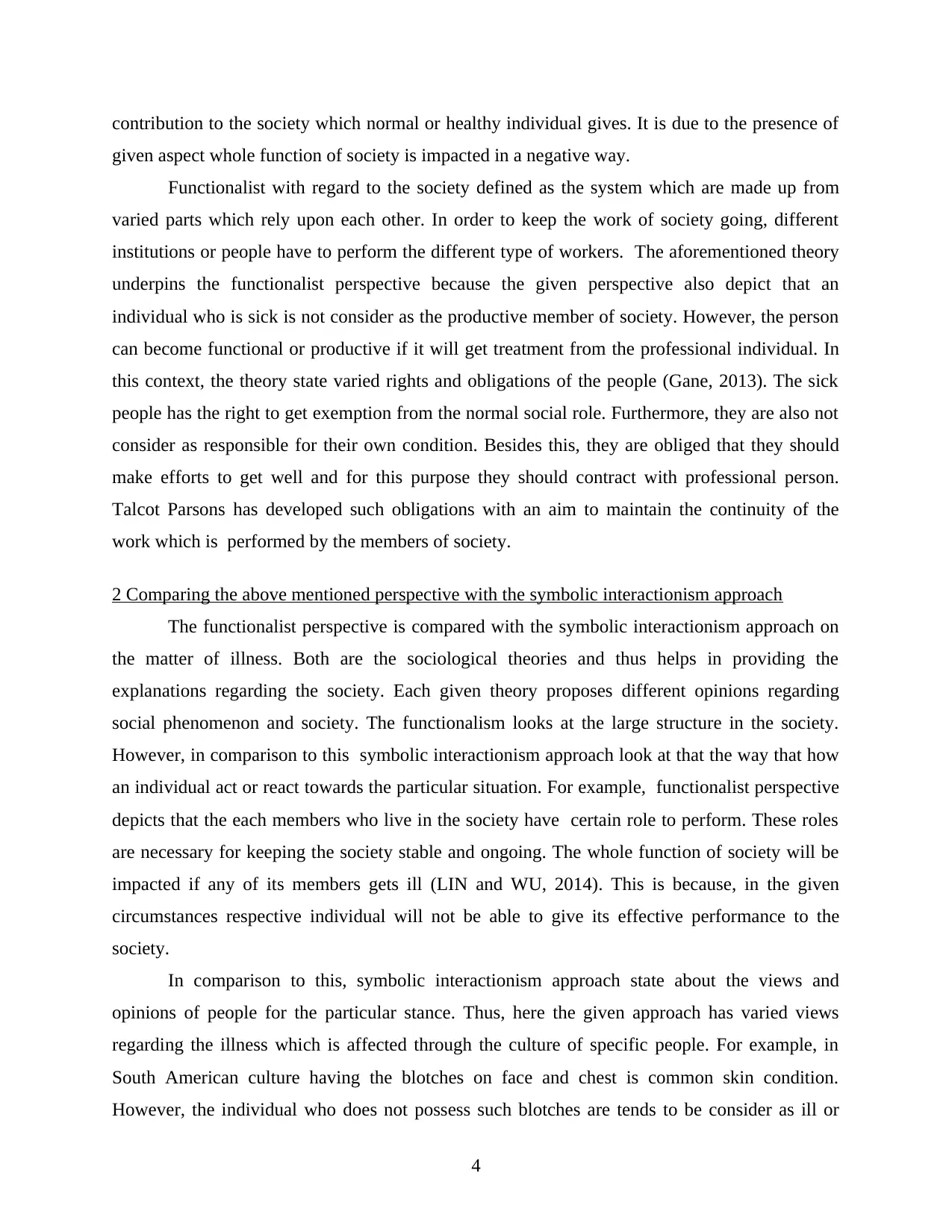
contribution to the society which normal or healthy individual gives. It is due to the presence of
given aspect whole function of society is impacted in a negative way.
Functionalist with regard to the society defined as the system which are made up from
varied parts which rely upon each other. In order to keep the work of society going, different
institutions or people have to perform the different type of workers. The aforementioned theory
underpins the functionalist perspective because the given perspective also depict that an
individual who is sick is not consider as the productive member of society. However, the person
can become functional or productive if it will get treatment from the professional individual. In
this context, the theory state varied rights and obligations of the people (Gane, 2013). The sick
people has the right to get exemption from the normal social role. Furthermore, they are also not
consider as responsible for their own condition. Besides this, they are obliged that they should
make efforts to get well and for this purpose they should contract with professional person.
Talcot Parsons has developed such obligations with an aim to maintain the continuity of the
work which is performed by the members of society.
2 Comparing the above mentioned perspective with the symbolic interactionism approach
The functionalist perspective is compared with the symbolic interactionism approach on
the matter of illness. Both are the sociological theories and thus helps in providing the
explanations regarding the society. Each given theory proposes different opinions regarding
social phenomenon and society. The functionalism looks at the large structure in the society.
However, in comparison to this symbolic interactionism approach look at that the way that how
an individual act or react towards the particular situation. For example, functionalist perspective
depicts that the each members who live in the society have certain role to perform. These roles
are necessary for keeping the society stable and ongoing. The whole function of society will be
impacted if any of its members gets ill (LIN and WU, 2014). This is because, in the given
circumstances respective individual will not be able to give its effective performance to the
society.
In comparison to this, symbolic interactionism approach state about the views and
opinions of people for the particular stance. Thus, here the given approach has varied views
regarding the illness which is affected through the culture of specific people. For example, in
South American culture having the blotches on face and chest is common skin condition.
However, the individual who does not possess such blotches are tends to be consider as ill or
4
given aspect whole function of society is impacted in a negative way.
Functionalist with regard to the society defined as the system which are made up from
varied parts which rely upon each other. In order to keep the work of society going, different
institutions or people have to perform the different type of workers. The aforementioned theory
underpins the functionalist perspective because the given perspective also depict that an
individual who is sick is not consider as the productive member of society. However, the person
can become functional or productive if it will get treatment from the professional individual. In
this context, the theory state varied rights and obligations of the people (Gane, 2013). The sick
people has the right to get exemption from the normal social role. Furthermore, they are also not
consider as responsible for their own condition. Besides this, they are obliged that they should
make efforts to get well and for this purpose they should contract with professional person.
Talcot Parsons has developed such obligations with an aim to maintain the continuity of the
work which is performed by the members of society.
2 Comparing the above mentioned perspective with the symbolic interactionism approach
The functionalist perspective is compared with the symbolic interactionism approach on
the matter of illness. Both are the sociological theories and thus helps in providing the
explanations regarding the society. Each given theory proposes different opinions regarding
social phenomenon and society. The functionalism looks at the large structure in the society.
However, in comparison to this symbolic interactionism approach look at that the way that how
an individual act or react towards the particular situation. For example, functionalist perspective
depicts that the each members who live in the society have certain role to perform. These roles
are necessary for keeping the society stable and ongoing. The whole function of society will be
impacted if any of its members gets ill (LIN and WU, 2014). This is because, in the given
circumstances respective individual will not be able to give its effective performance to the
society.
In comparison to this, symbolic interactionism approach state about the views and
opinions of people for the particular stance. Thus, here the given approach has varied views
regarding the illness which is affected through the culture of specific people. For example, in
South American culture having the blotches on face and chest is common skin condition.
However, the individual who does not possess such blotches are tends to be consider as ill or
4
⊘ This is a preview!⊘
Do you want full access?
Subscribe today to unlock all pages.

Trusted by 1+ million students worldwide
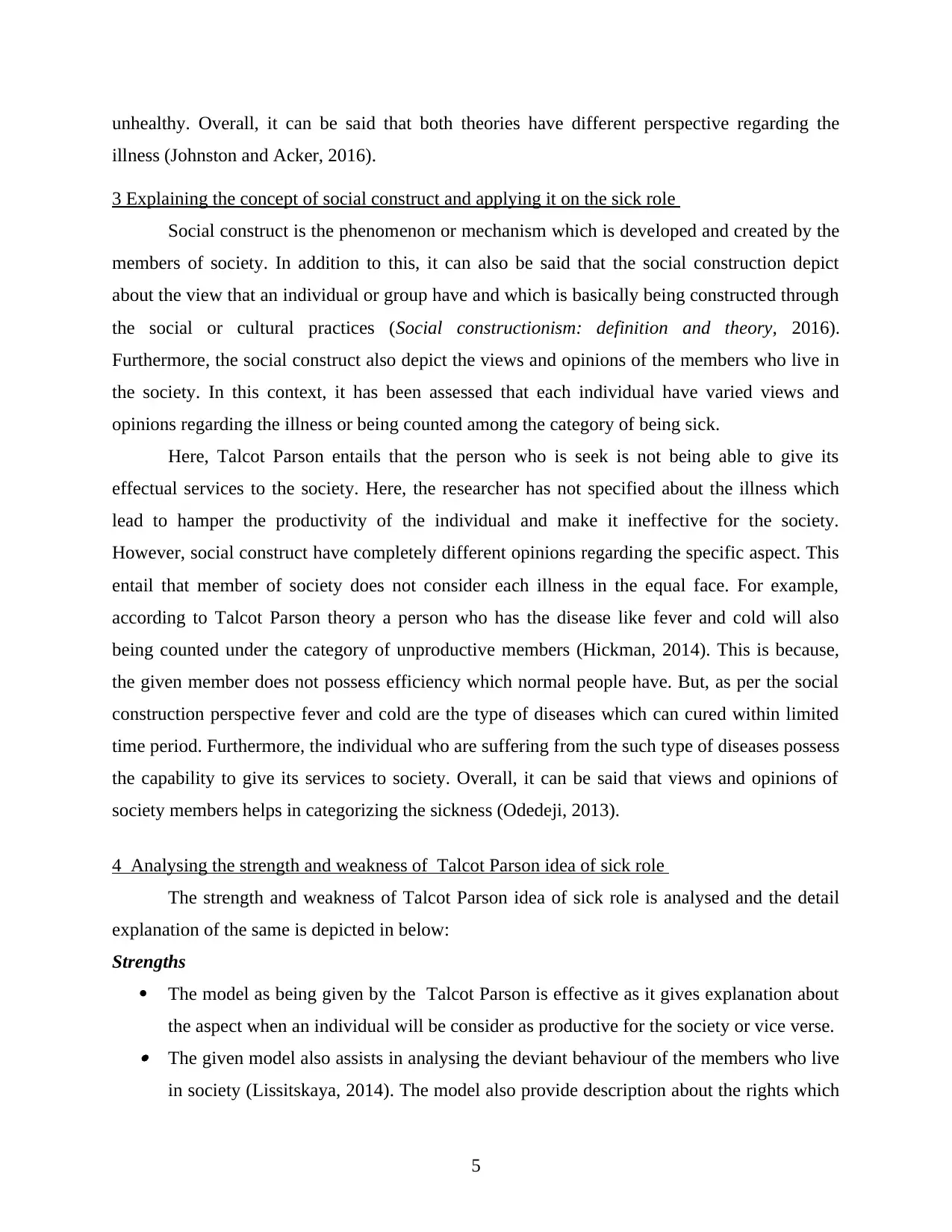
unhealthy. Overall, it can be said that both theories have different perspective regarding the
illness (Johnston and Acker, 2016).
3 Explaining the concept of social construct and applying it on the sick role
Social construct is the phenomenon or mechanism which is developed and created by the
members of society. In addition to this, it can also be said that the social construction depict
about the view that an individual or group have and which is basically being constructed through
the social or cultural practices (Social constructionism: definition and theory, 2016).
Furthermore, the social construct also depict the views and opinions of the members who live in
the society. In this context, it has been assessed that each individual have varied views and
opinions regarding the illness or being counted among the category of being sick.
Here, Talcot Parson entails that the person who is seek is not being able to give its
effectual services to the society. Here, the researcher has not specified about the illness which
lead to hamper the productivity of the individual and make it ineffective for the society.
However, social construct have completely different opinions regarding the specific aspect. This
entail that member of society does not consider each illness in the equal face. For example,
according to Talcot Parson theory a person who has the disease like fever and cold will also
being counted under the category of unproductive members (Hickman, 2014). This is because,
the given member does not possess efficiency which normal people have. But, as per the social
construction perspective fever and cold are the type of diseases which can cured within limited
time period. Furthermore, the individual who are suffering from the such type of diseases possess
the capability to give its services to society. Overall, it can be said that views and opinions of
society members helps in categorizing the sickness (Odedeji, 2013).
4 Analysing the strength and weakness of Talcot Parson idea of sick role
The strength and weakness of Talcot Parson idea of sick role is analysed and the detail
explanation of the same is depicted in below:
Strengths
The model as being given by the Talcot Parson is effective as it gives explanation about
the aspect when an individual will be consider as productive for the society or vice verse. The given model also assists in analysing the deviant behaviour of the members who live
in society (Lissitskaya, 2014). The model also provide description about the rights which
5
illness (Johnston and Acker, 2016).
3 Explaining the concept of social construct and applying it on the sick role
Social construct is the phenomenon or mechanism which is developed and created by the
members of society. In addition to this, it can also be said that the social construction depict
about the view that an individual or group have and which is basically being constructed through
the social or cultural practices (Social constructionism: definition and theory, 2016).
Furthermore, the social construct also depict the views and opinions of the members who live in
the society. In this context, it has been assessed that each individual have varied views and
opinions regarding the illness or being counted among the category of being sick.
Here, Talcot Parson entails that the person who is seek is not being able to give its
effectual services to the society. Here, the researcher has not specified about the illness which
lead to hamper the productivity of the individual and make it ineffective for the society.
However, social construct have completely different opinions regarding the specific aspect. This
entail that member of society does not consider each illness in the equal face. For example,
according to Talcot Parson theory a person who has the disease like fever and cold will also
being counted under the category of unproductive members (Hickman, 2014). This is because,
the given member does not possess efficiency which normal people have. But, as per the social
construction perspective fever and cold are the type of diseases which can cured within limited
time period. Furthermore, the individual who are suffering from the such type of diseases possess
the capability to give its services to society. Overall, it can be said that views and opinions of
society members helps in categorizing the sickness (Odedeji, 2013).
4 Analysing the strength and weakness of Talcot Parson idea of sick role
The strength and weakness of Talcot Parson idea of sick role is analysed and the detail
explanation of the same is depicted in below:
Strengths
The model as being given by the Talcot Parson is effective as it gives explanation about
the aspect when an individual will be consider as productive for the society or vice verse. The given model also assists in analysing the deviant behaviour of the members who live
in society (Lissitskaya, 2014). The model also provide description about the rights which
5
Paraphrase This Document
Need a fresh take? Get an instant paraphrase of this document with our AI Paraphraser
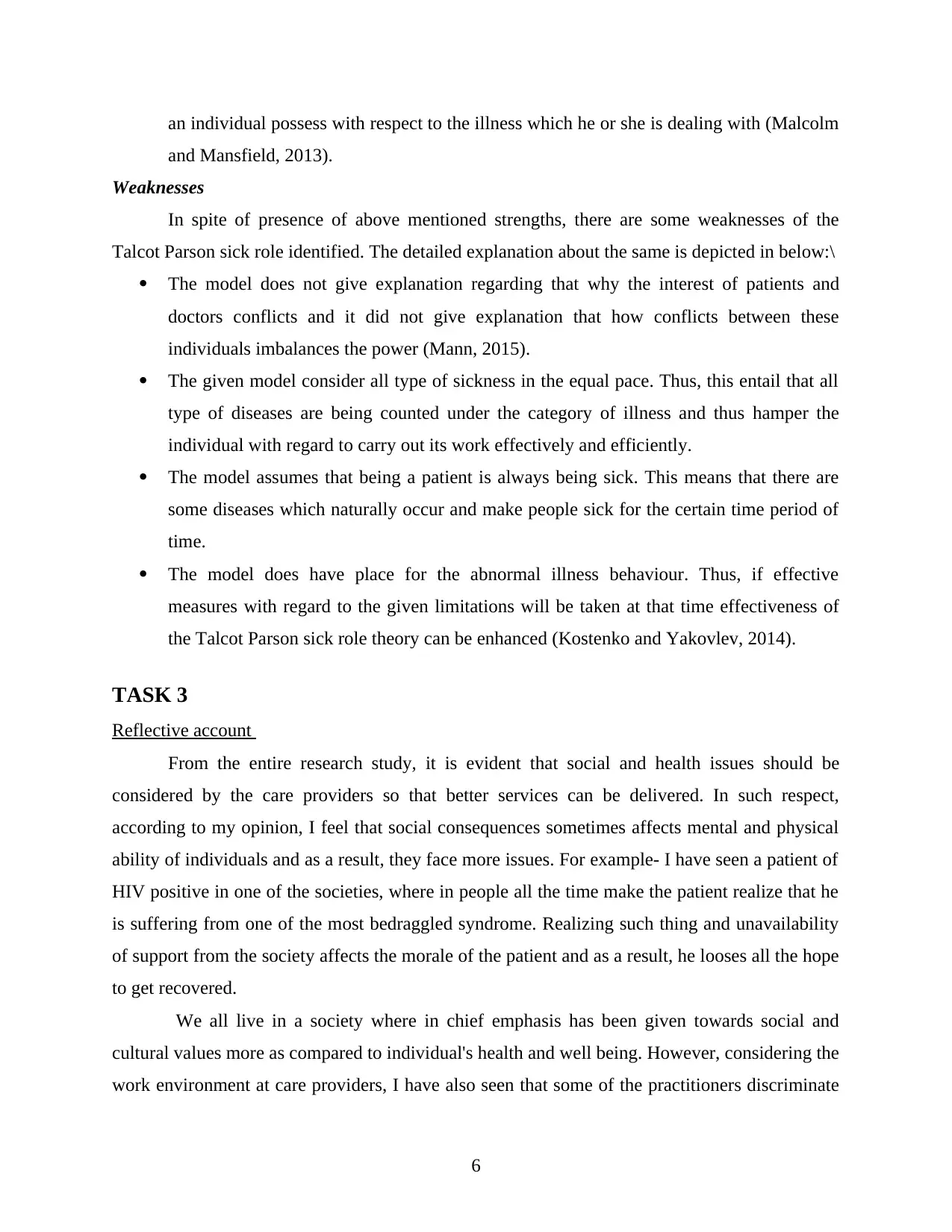
an individual possess with respect to the illness which he or she is dealing with (Malcolm
and Mansfield, 2013).
Weaknesses
In spite of presence of above mentioned strengths, there are some weaknesses of the
Talcot Parson sick role identified. The detailed explanation about the same is depicted in below:\
The model does not give explanation regarding that why the interest of patients and
doctors conflicts and it did not give explanation that how conflicts between these
individuals imbalances the power (Mann, 2015).
The given model consider all type of sickness in the equal pace. Thus, this entail that all
type of diseases are being counted under the category of illness and thus hamper the
individual with regard to carry out its work effectively and efficiently.
The model assumes that being a patient is always being sick. This means that there are
some diseases which naturally occur and make people sick for the certain time period of
time.
The model does have place for the abnormal illness behaviour. Thus, if effective
measures with regard to the given limitations will be taken at that time effectiveness of
the Talcot Parson sick role theory can be enhanced (Kostenko and Yakovlev, 2014).
TASK 3
Reflective account
From the entire research study, it is evident that social and health issues should be
considered by the care providers so that better services can be delivered. In such respect,
according to my opinion, I feel that social consequences sometimes affects mental and physical
ability of individuals and as a result, they face more issues. For example- I have seen a patient of
HIV positive in one of the societies, where in people all the time make the patient realize that he
is suffering from one of the most bedraggled syndrome. Realizing such thing and unavailability
of support from the society affects the morale of the patient and as a result, he looses all the hope
to get recovered.
We all live in a society where in chief emphasis has been given towards social and
cultural values more as compared to individual's health and well being. However, considering the
work environment at care providers, I have also seen that some of the practitioners discriminate
6
and Mansfield, 2013).
Weaknesses
In spite of presence of above mentioned strengths, there are some weaknesses of the
Talcot Parson sick role identified. The detailed explanation about the same is depicted in below:\
The model does not give explanation regarding that why the interest of patients and
doctors conflicts and it did not give explanation that how conflicts between these
individuals imbalances the power (Mann, 2015).
The given model consider all type of sickness in the equal pace. Thus, this entail that all
type of diseases are being counted under the category of illness and thus hamper the
individual with regard to carry out its work effectively and efficiently.
The model assumes that being a patient is always being sick. This means that there are
some diseases which naturally occur and make people sick for the certain time period of
time.
The model does have place for the abnormal illness behaviour. Thus, if effective
measures with regard to the given limitations will be taken at that time effectiveness of
the Talcot Parson sick role theory can be enhanced (Kostenko and Yakovlev, 2014).
TASK 3
Reflective account
From the entire research study, it is evident that social and health issues should be
considered by the care providers so that better services can be delivered. In such respect,
according to my opinion, I feel that social consequences sometimes affects mental and physical
ability of individuals and as a result, they face more issues. For example- I have seen a patient of
HIV positive in one of the societies, where in people all the time make the patient realize that he
is suffering from one of the most bedraggled syndrome. Realizing such thing and unavailability
of support from the society affects the morale of the patient and as a result, he looses all the hope
to get recovered.
We all live in a society where in chief emphasis has been given towards social and
cultural values more as compared to individual's health and well being. However, considering the
work environment at care providers, I have also seen that some of the practitioners discriminate
6
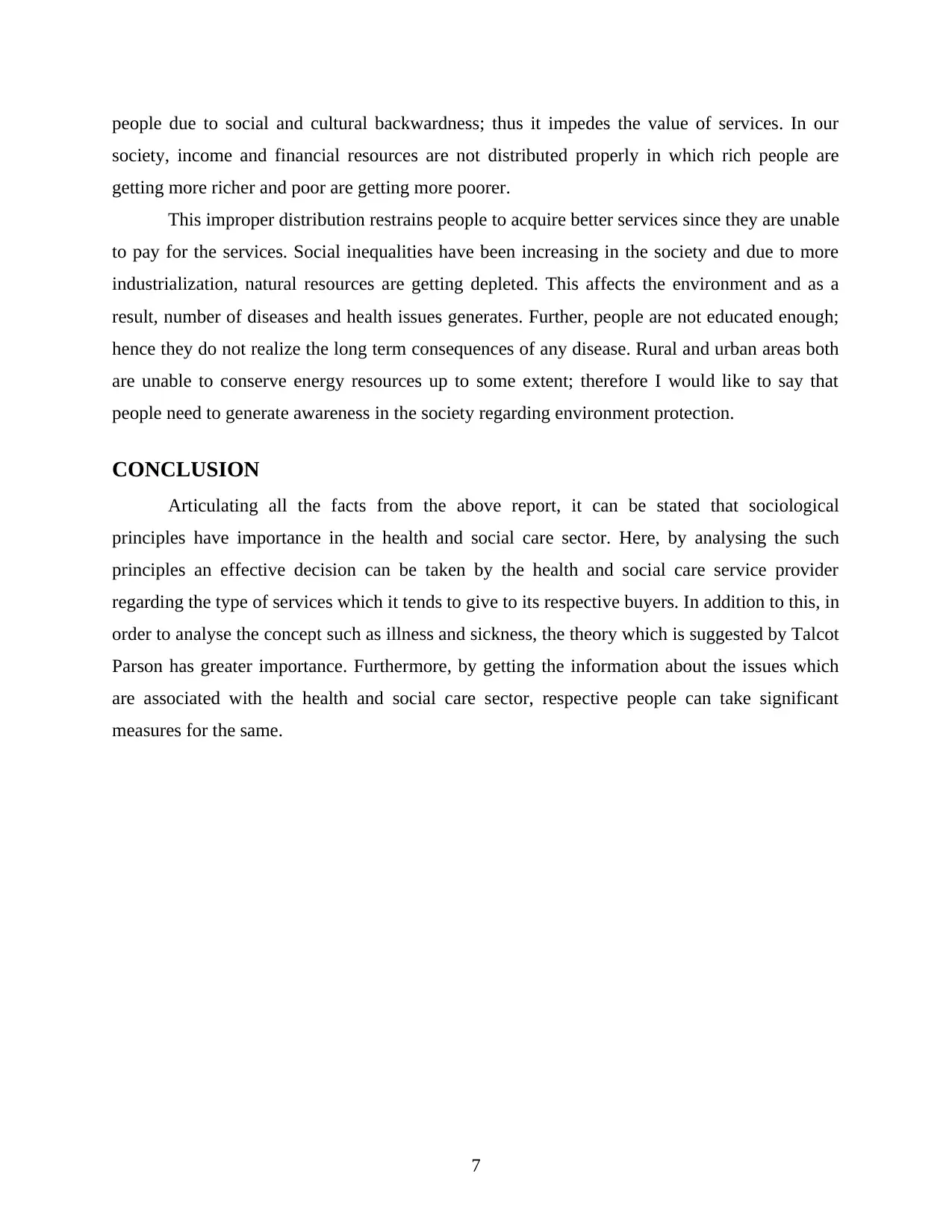
people due to social and cultural backwardness; thus it impedes the value of services. In our
society, income and financial resources are not distributed properly in which rich people are
getting more richer and poor are getting more poorer.
This improper distribution restrains people to acquire better services since they are unable
to pay for the services. Social inequalities have been increasing in the society and due to more
industrialization, natural resources are getting depleted. This affects the environment and as a
result, number of diseases and health issues generates. Further, people are not educated enough;
hence they do not realize the long term consequences of any disease. Rural and urban areas both
are unable to conserve energy resources up to some extent; therefore I would like to say that
people need to generate awareness in the society regarding environment protection.
CONCLUSION
Articulating all the facts from the above report, it can be stated that sociological
principles have importance in the health and social care sector. Here, by analysing the such
principles an effective decision can be taken by the health and social care service provider
regarding the type of services which it tends to give to its respective buyers. In addition to this, in
order to analyse the concept such as illness and sickness, the theory which is suggested by Talcot
Parson has greater importance. Furthermore, by getting the information about the issues which
are associated with the health and social care sector, respective people can take significant
measures for the same.
7
society, income and financial resources are not distributed properly in which rich people are
getting more richer and poor are getting more poorer.
This improper distribution restrains people to acquire better services since they are unable
to pay for the services. Social inequalities have been increasing in the society and due to more
industrialization, natural resources are getting depleted. This affects the environment and as a
result, number of diseases and health issues generates. Further, people are not educated enough;
hence they do not realize the long term consequences of any disease. Rural and urban areas both
are unable to conserve energy resources up to some extent; therefore I would like to say that
people need to generate awareness in the society regarding environment protection.
CONCLUSION
Articulating all the facts from the above report, it can be stated that sociological
principles have importance in the health and social care sector. Here, by analysing the such
principles an effective decision can be taken by the health and social care service provider
regarding the type of services which it tends to give to its respective buyers. In addition to this, in
order to analyse the concept such as illness and sickness, the theory which is suggested by Talcot
Parson has greater importance. Furthermore, by getting the information about the issues which
are associated with the health and social care sector, respective people can take significant
measures for the same.
7
⊘ This is a preview!⊘
Do you want full access?
Subscribe today to unlock all pages.

Trusted by 1+ million students worldwide
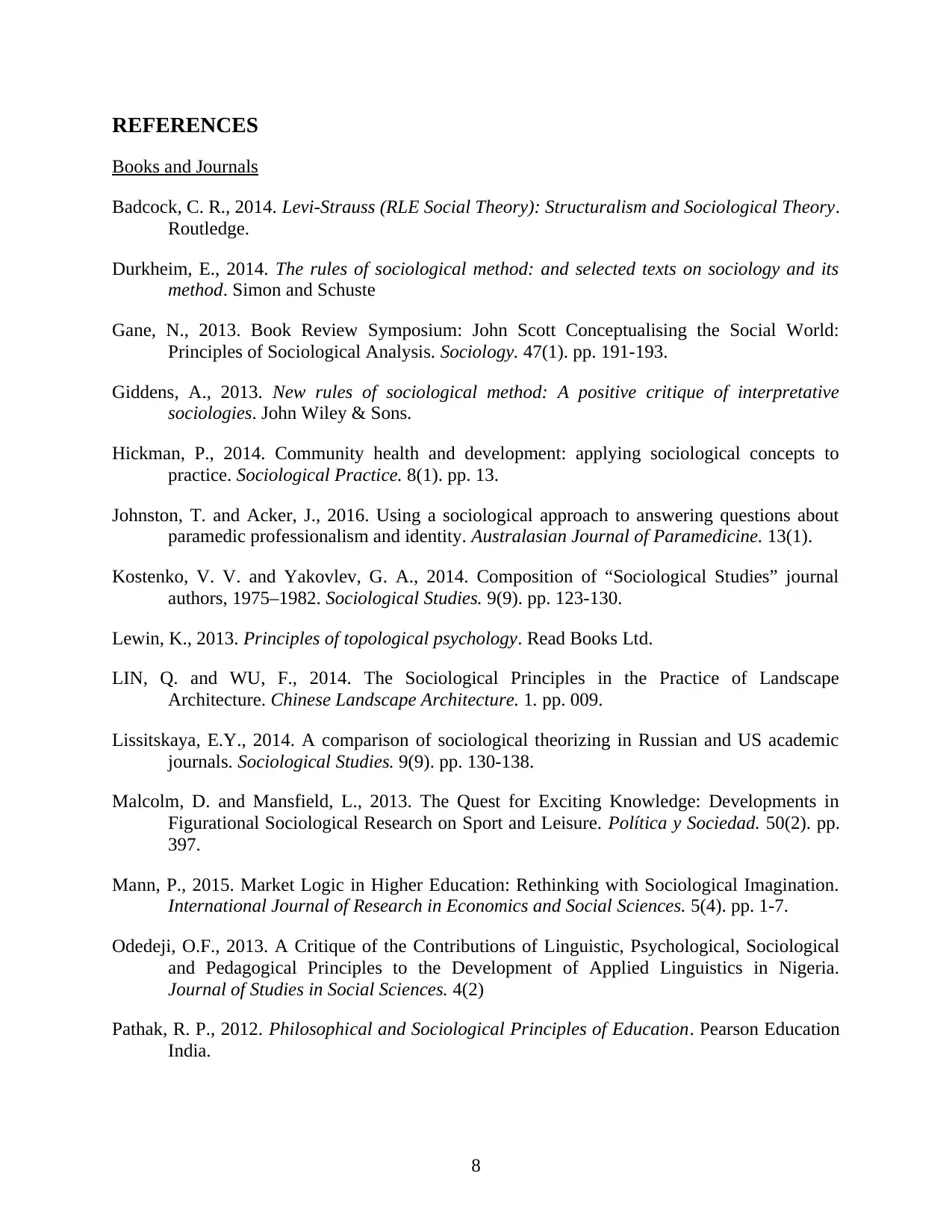
REFERENCES
Books and Journals
Badcock, C. R., 2014. Levi-Strauss (RLE Social Theory): Structuralism and Sociological Theory.
Routledge.
Durkheim, E., 2014. The rules of sociological method: and selected texts on sociology and its
method. Simon and Schuste
Gane, N., 2013. Book Review Symposium: John Scott Conceptualising the Social World:
Principles of Sociological Analysis. Sociology. 47(1). pp. 191-193.
Giddens, A., 2013. New rules of sociological method: A positive critique of interpretative
sociologies. John Wiley & Sons.
Hickman, P., 2014. Community health and development: applying sociological concepts to
practice. Sociological Practice. 8(1). pp. 13.
Johnston, T. and Acker, J., 2016. Using a sociological approach to answering questions about
paramedic professionalism and identity. Australasian Journal of Paramedicine. 13(1).
Kostenko, V. V. and Yakovlev, G. A., 2014. Composition of “Sociological Studies” journal
authors, 1975–1982. Sociological Studies. 9(9). pp. 123-130.
Lewin, K., 2013. Principles of topological psychology. Read Books Ltd.
LIN, Q. and WU, F., 2014. The Sociological Principles in the Practice of Landscape
Architecture. Chinese Landscape Architecture. 1. pp. 009.
Lissitskaya, E.Y., 2014. A comparison of sociological theorizing in Russian and US academic
journals. Sociological Studies. 9(9). pp. 130-138.
Malcolm, D. and Mansfield, L., 2013. The Quest for Exciting Knowledge: Developments in
Figurational Sociological Research on Sport and Leisure. Política y Sociedad. 50(2). pp.
397.
Mann, P., 2015. Market Logic in Higher Education: Rethinking with Sociological Imagination.
International Journal of Research in Economics and Social Sciences. 5(4). pp. 1-7.
Odedeji, O.F., 2013. A Critique of the Contributions of Linguistic, Psychological, Sociological
and Pedagogical Principles to the Development of Applied Linguistics in Nigeria.
Journal of Studies in Social Sciences. 4(2)
Pathak, R. P., 2012. Philosophical and Sociological Principles of Education. Pearson Education
India.
8
Books and Journals
Badcock, C. R., 2014. Levi-Strauss (RLE Social Theory): Structuralism and Sociological Theory.
Routledge.
Durkheim, E., 2014. The rules of sociological method: and selected texts on sociology and its
method. Simon and Schuste
Gane, N., 2013. Book Review Symposium: John Scott Conceptualising the Social World:
Principles of Sociological Analysis. Sociology. 47(1). pp. 191-193.
Giddens, A., 2013. New rules of sociological method: A positive critique of interpretative
sociologies. John Wiley & Sons.
Hickman, P., 2014. Community health and development: applying sociological concepts to
practice. Sociological Practice. 8(1). pp. 13.
Johnston, T. and Acker, J., 2016. Using a sociological approach to answering questions about
paramedic professionalism and identity. Australasian Journal of Paramedicine. 13(1).
Kostenko, V. V. and Yakovlev, G. A., 2014. Composition of “Sociological Studies” journal
authors, 1975–1982. Sociological Studies. 9(9). pp. 123-130.
Lewin, K., 2013. Principles of topological psychology. Read Books Ltd.
LIN, Q. and WU, F., 2014. The Sociological Principles in the Practice of Landscape
Architecture. Chinese Landscape Architecture. 1. pp. 009.
Lissitskaya, E.Y., 2014. A comparison of sociological theorizing in Russian and US academic
journals. Sociological Studies. 9(9). pp. 130-138.
Malcolm, D. and Mansfield, L., 2013. The Quest for Exciting Knowledge: Developments in
Figurational Sociological Research on Sport and Leisure. Política y Sociedad. 50(2). pp.
397.
Mann, P., 2015. Market Logic in Higher Education: Rethinking with Sociological Imagination.
International Journal of Research in Economics and Social Sciences. 5(4). pp. 1-7.
Odedeji, O.F., 2013. A Critique of the Contributions of Linguistic, Psychological, Sociological
and Pedagogical Principles to the Development of Applied Linguistics in Nigeria.
Journal of Studies in Social Sciences. 4(2)
Pathak, R. P., 2012. Philosophical and Sociological Principles of Education. Pearson Education
India.
8
Paraphrase This Document
Need a fresh take? Get an instant paraphrase of this document with our AI Paraphraser
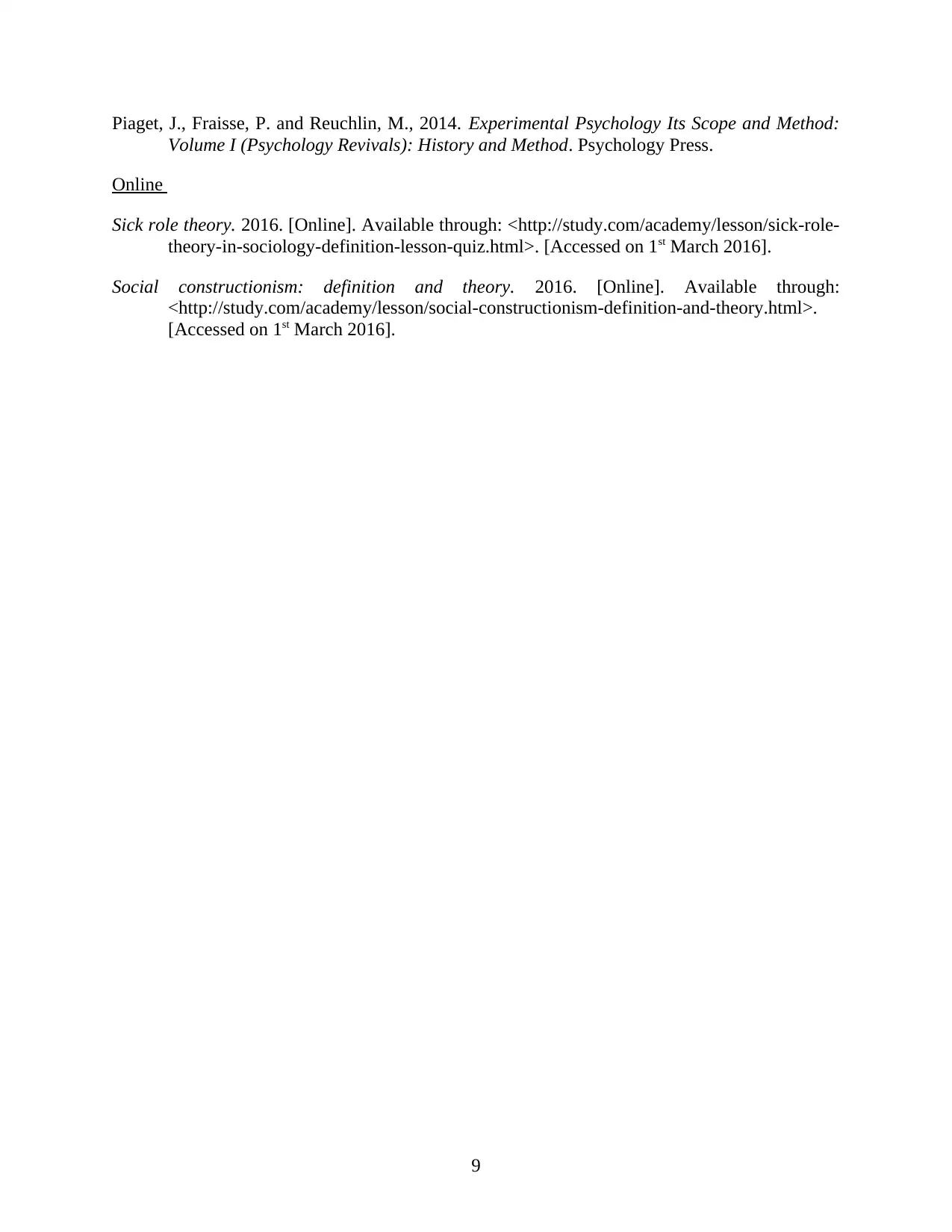
Piaget, J., Fraisse, P. and Reuchlin, M., 2014. Experimental Psychology Its Scope and Method:
Volume I (Psychology Revivals): History and Method. Psychology Press.
Online
Sick role theory. 2016. [Online]. Available through: <http://study.com/academy/lesson/sick-role-
theory-in-sociology-definition-lesson-quiz.html>. [Accessed on 1st March 2016].
Social constructionism: definition and theory. 2016. [Online]. Available through:
<http://study.com/academy/lesson/social-constructionism-definition-and-theory.html>.
[Accessed on 1st March 2016].
9
Volume I (Psychology Revivals): History and Method. Psychology Press.
Online
Sick role theory. 2016. [Online]. Available through: <http://study.com/academy/lesson/sick-role-
theory-in-sociology-definition-lesson-quiz.html>. [Accessed on 1st March 2016].
Social constructionism: definition and theory. 2016. [Online]. Available through:
<http://study.com/academy/lesson/social-constructionism-definition-and-theory.html>.
[Accessed on 1st March 2016].
9
1 out of 11
Related Documents
Your All-in-One AI-Powered Toolkit for Academic Success.
+13062052269
info@desklib.com
Available 24*7 on WhatsApp / Email
![[object Object]](/_next/static/media/star-bottom.7253800d.svg)
Unlock your academic potential
Copyright © 2020–2026 A2Z Services. All Rights Reserved. Developed and managed by ZUCOL.





